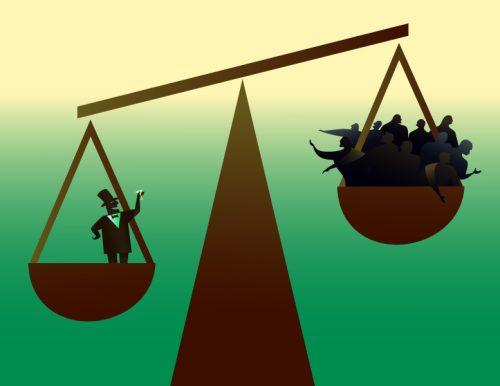Post originally appeared on WalkerViewPoints on 3/26/20
Inequality has steadily escalated since the days of Reagan and Thatcher. It’s now deeply ingrained in every aspect of our society. And, no matter what the major problem of the world, the less fortunate always get the short end of the stick. The environment is a good example. As we continue to pollute our water, who is forced to live by the polluted lakes, streams, and rivers? The poor, of course. The rest of us can live on high ground and drink bottled water.
So, here we are again. This time it is the Coronavirus pandemic. Sure, it is affecting all of us. Even a billionaire or two might succumb to the disease, no matter his access to the very best health care. But in the total population, the losers are going to be the underprivileged, the poor, the economically unequal.
First, their living conditions are far from optimal to maintain social distancing. They can only afford less effective health care, if any at all. Many are still uninsured, a tragedy for a country of our wealth. On top of all that, they have little or no economic protection, living paycheck to paycheck, as many of them do. So, when the airlines, cruise lines, and hotels lay off thousands, when those are followed by the small businesses, restaurants, and even the laundries, cleaning services and all of that, what can they do? They can only survive a few weeks or a few months, usually even that by exhausting their retirement or emergency savings.
What then? Last week, the government approved measures that will put $1,200 into the hands of nearly every American. But this is hardly enough to live on for a couple of weeks, let alone a month or two. For example, if your inner-city rent is $2,000, not uncommon in our major cities, this won’t even cover one month’s rent or the utilities. And if these folks had any savings, say a 401K or whatever, that’s been diminished as of today by about 30%.
Now to the debate of the day: Continue to “Shelter in Place,” or open up the system and go back to work? The Left is aghast at the idea that we might lift the Shelter regulations. The Right is paranoid about the harm to the economy, and perhaps to the stock market.
I can’t resist chiding my friends who pushed back on my concerns for inequality when I argued that about half of America receives little benefit from the stock market. They argued that everyone has some sort of retirement fund, however small it may be, and it is invested in stock–therefore we ALL prosper from the stock market. Well, that’s pretty academic now. Many Americans have little, if any, after all this is dealt with.
What’s the answer? Shelter or go back to work? There is another way but it requires a comprehensive and aggressive plan to mass test every American.
The failure to adequately test the American population is wholly due to the Trump administration’s insistence to keep numbers low to protect the opinion of his leadership and his cuts to the CDC’s budget. Compared to other nations dealing with this crisis we are far below adequate testing numbers. In order to get Americans back to work, we need widespread testing to figure out which parts of the country need more assistance, who’s now immune, and who currently has it.
If we have comprehensive data we can ensure certain people can return to work and get our economy running again. The choice between saving lives and saving the economy is only presented to us because of the failure of our federal government to prevent and contain this disaster.
However, there is no easy solution. People are going to suffer and like all disasters, the fallout will disproportionately fall on the shoulders of the economically unequal.
One can only hope that this tragedy is enough to wake up our legislators to the desperate need to begin to restructure our entire economic system to enable real shared prosperity. If not, a revolution could be a lot closer than we ever imagined.
